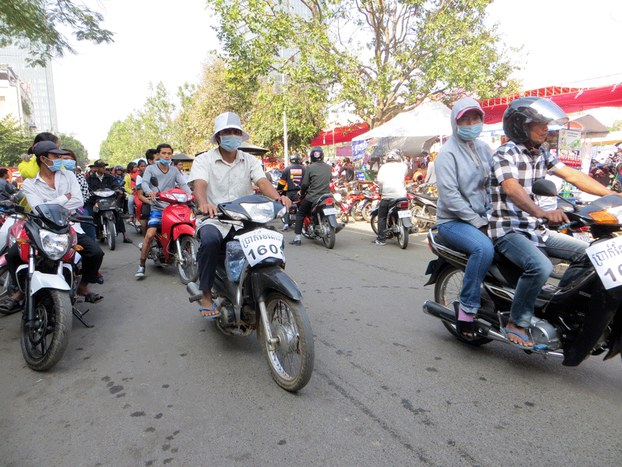




Striking Cambodian garment and footwear workers clashed with police and blocked a key highway in the capital Phnom Penh on Friday as talks between unions and the government failed to resolve a dispute over minimum wages, according to officials and workers' representatives.
Seven workers and seven military police officers were injured in clashes outside the Phnom Penh Special Economic Zone which erupted after the workers were prevented from entering the zone, they said. The workers had wanted to enter the zone to encourage fellow workers to join a protest rally.
“Our stand is that we will continue to go on strike until we have a result,” Rong Chhun, president of the Cambodian Confederation of Unions (CCU), told RFA's Khmer Service, after negotiations between six union representatives and the Ministry of Labor failed to end a dispute over a minimum wage that was determined by the government this week.
Thousands of workers protested in front of the ministry building as the negotiations were held, virtually sealing off Mao Tse Tung Boulevard.
Rong Chhun said workers from hundreds of factories have gone on strike to protest a government announcement increasing the monthly minimum wage for garment and footwear workers from U.S. $80 to U.S. $95. The government had rejected demands from workers unions that the wage be doubled with immediate effect to U.S. $160.
The strikes were supported by the opposition Cambodia National Rescue Party (CNRP), which had been holding daily protests for the second week in a bid to press Prime Minister Hun Sen to hold a re-election following disputed July 28 polls.
A ministry plea Friday for workers to return to work as the negotiations continue was rejected by unions.
"The ministry will encourage the two parties [unions and the employers] to have further talks on Monday, Dec 30,” a ministry statement said, calling for any strikes and demonstrations to be held "according to the law" and condemning any "destruction of private and state properties.”
The Garment Manufacturers Association in Cambodia (GMAC), the industry body, had recommended on Thursday that factories stop operations for a week, citing fears that demonstrators might damage factories if workers do not join the strikes.
The striking workers on Friday also blocked the key National Route Four highway to back their demands for higher wages, prompting military police officers to charge at the demonstrators using electric batons, shields, and guns.
A human rights campaigner said police fired warning shots during the brief clash
The authorities fired "many warning shots" into the air and hit protesters with their batons, Am Sam Ath of local rights group Licadho told Agence France-Presse.
Phnom Penh Military Police Chief Roth Sreng told RFA that the clash occurred after the workers threw stones at the officers, seven of whom he said were injured.
The workers cleared the highway after the military officers released three workers who had been arrested.
In a separate protest, thousands of workers on Friday joined daily anti-government demonstrations organized by the CNRP at Freedom Park, demanding that the government double the minimum wage and calling on Hun Sen to resign.
Shouting "Hun Sen must go," the workers backed CNRP demands that the prime minister quit to pave the way for new elections, citing increasing corruption as among reasons.
A worker at the demonstration questioned the government decision to increase the minimum wage by U.S $15.
“A 15-dollar increase means nothing,” she said, citing what she felt was a steep rise in the cost of living.
Another worker said the meager rise in the minimum wage indicated that the government was looking down on the local workers.
“The government doesn’t pay attention to the workers. They pay attention only to the foreigners,” she said. “I want the money and I also want a change in the country's leadership. He [Hun Sen] has been in power for nearly 30 years, the country has become so corrupt,” she said.
Another worker said rising inflation is taking a toll on the workers.
CNRP leader Sam Rainsy called on the workers to help the party take over the government.
“We must struggle together,” Sam Rainsy told the crowd. “Everyone needs dignity. To have dignity now, each worker needs about 160 dollars [as the monthly minimum wage],” he said. “If we get a salary lower than 160 dollars, we are not humans, we are animals,” he said. “We must protect our dignity.”
Reported by RFA's Khmer Service. Translated by Samean Yun. Written in English by Parameswaran Ponnudurai.